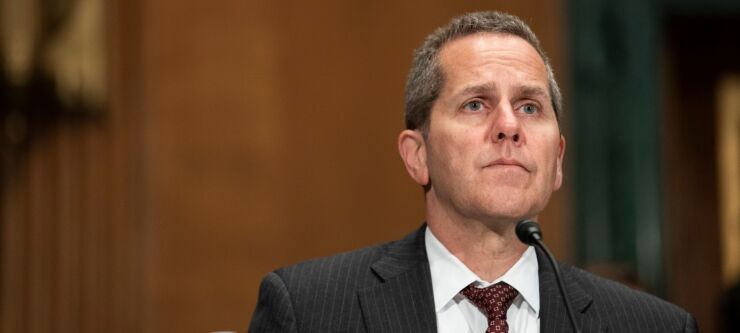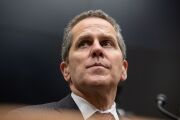
The Federal Reserve's chief regulator
Fed Vice Chair for Supervision Michael Barr testified in front of the House Financial Services Committee on Tuesday about the state of bank regulation and his recent review of the failure of Silicon Valley Bank. He was joined by leaders of the Federal Deposit Insurance Corp., the Office of the Comptroller of the Currency and the National Credit Union Administration.
"We need to enhance our system of supervision to make it more agile, more quick," Barr said. "We need to also improve our system of regulation so that we have the kind of resiliency we need with capital and liquidity in the system."
But some lawmakers said Barr's findings
Because of this, many committee members challenged Barr's call for revisiting the current tiering system for capital and liquidity requirements.
"Vice Chair Barr, you've signaled your desire to go beyond reviewing supervisory failures that contributed to the recent bank failures and use this crisis to justify progressive's long-held priority to increase capital requirements and imposed new regulations on banks that predates this crisis," Rep. Patrick McHenry, R-N.C., the chair of the committee said. "You're using this crisis to justify your pre-baked ideas."
Democrats, meanwhile, largely avoided the topic of capital requirements. Instead, they focused on the lack of accountability placed on bank leadership. Some committee members urged regulators to impose limitations on executive compensation and enact regulations that allowed for bonuses to be clawed back.
Democrats broadly supported the actions taken by regulators to shore up the banking system in the wake of recent failures. Some agreed with Barr's conclusion that Trump era changes to regulation made bank's less resilient in the face of an exogenous shock.
"Regulators actually implemented the law the way it was intended to be implemented, which was to deregulate and non-stress-test these medium-sized banks," Rep. Brad Sherman, D-Calif., said. "So now we say we blame them because they did what the Republican Congress told them to do."
Yet, Republicans pointed to the Fed's own assessment that the banking system remains well capitalized as proof that enhancing capital rules are unnecessary.
"In the face of a growing credit crunch and risk of a recession, moving rapidly to increasing capital requirements on an already well-capitalized banking system would be a mistake," Rep. Andy Barr, R-Ky., said.
Barr acknowledged that the banking system is well capitalized under the current regulatory framework, but he said the failure of Silicon Valley Bank demonstrates the shortcomings of those standards. In particular, he highlighted the treatment of accumulated other comprehensive income, or AOCI, and the ability of some banks to opt out of having certain gains and losses counted toward their capital requirements as things that should be addressed.
Barr said he would like to see the AOCI opt-out eliminated for all banks with at least $100 billion of assets "to more accurately reflect their financial condition." Currently, only the largest banks must count unrealized gains and losses on their securities portfolios toward their capital calculations.
Had Silicon Valley Bank not been allowed to opt out, it would have had to increase its Tier 1 capital by roughly $2 billion, Barr said, arguing that additional capital could have quelled the investor concerns that led to the historic run on the bank's deposits in March.
"Because the depositors saw the solvency of the firm as a concern, that is why they ran," Barr said. "I do think both solvency and liquidity risks are intertwined in this case."
Some lawmakers argued that because Silicon Valley Bank, Signature Bank and First Republic Bank all had "idiosyncratic" business models — ones focused on specific industries and reliant on uninsured deposits for funding — they should not be used as templates for designing rules that affect the entire banking system.
"My concern here is that, in the words of John F. Kennedy, you know, never let a good crisis go to waste," Rep. William Timmons, R-S.C., said during the hearing. "I'm concerned that the Fed, specifically, is looking at exploiting what has happened over the course of the last three months with these three banks as an opportunity to really open up the regulatory channels and start governing by fiat in a way that really should be in the role of Congress."
Barr said just because the banks that failed had unique components does not mean regulators should not "shutter our eyes" to the weaknesses they exposed. He added that shocks to the banking system are inherently unpredictable, so when a new set of risks become apparent, it is the Fed's obligation to adjust its rules accordingly.
Barr also defended his "holistic" review of capital standards — which was one his top priorities upon being sworn into office last summer and was kicked off months before the banking crisis began — as a necessary exercise.
"A capital review is to look at whether the capital rules are appropriately meeting their objectives," he said. "Despite the fact that the capital in the system is strong, it might be the case that it needs to be stronger and that the banking system might need additional capital to be more resilient, precisely because we don't know the nature of the kinds of ways we might experience shocks to the system, as has happened with these recent bank failures."
On multiple occasions, Barr was also asked to respond to fellow
"She's agreed with many of us here on this committee that the bank failures that we saw were the direct result of mismanagement and supervision, not the current capital regulatory requirements that some on the other side of the aisle may say," Rep. Zach Nunn, R-Iowa, said during the hearing. "Do you agree or disagree with Gov. Bowman on her assessment?"
"I agree that we should be careful and prudent in thinking about how to make capital changes," Barr said. "I do think it's appropriate for us to look at whether capital requirements for firms $100 billion and above are appropriate in the current circumstance."
He added that any rule change would be put through a yearslong rulemaking process that would include periods for public review and comment.
Barr also noted that it is within the Fed's discretion, under the Economic Growth, Regulatory Relief and Consumer Protection Act of 2018 — the provision that led to the Fed's much-debated changes to regulator tailoring — to determine what level of capital requirements and supervision should be applied to banks with between $100 billion and $250 billion of assets.
"There is authority under the statute for us to make those changes, and we intend to use that authority as appropriate to make adjustments to our supervisory framework," he said.
Still, some Republicans would be willing to go great lengths to stop the Fed from altering its capital rules in response to the banking crisis. Rep. Warren Davidson, R-Ohio, told American Banker that such action would add momentum to his effort to subject the Fed to congressional appropriations.
"The biggest thing we could do is adopt my bill, the Federal Reserve Regulatory Oversight Reform Act, which would decouple the [regulatory wing of the] Federal Reserve banks from the part that does monetary policy, put them on appropriations and have one prudential bank regulator. That would be the most radical thing we could do," Davidson said. "We could do any number of things. That way, ultimately, we have our hooks with appropriations."







